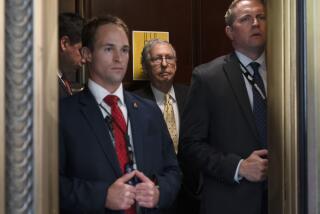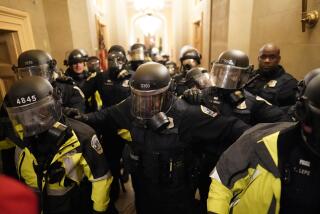Bush Demands Bureaucratic Leeway for Security Agency
WASHINGTON — President Bush and Senate Democrats disagreed sharply Saturday about managing the proposed Homeland Security Department, with Bush saying he needs the greatest leeway to combat terrorism.
The new Cabinet-level agency “must be able to move people and resources quickly, without being forced to comply with a thick book of bureaucratic rules,” Bush said in his weekly radio address.
“One essential tool this new department needs is the flexibility to respond to terrorist threats that can arise or change overnight,”
But Sen. Joseph I. Lieberman (D-Conn.), responding for his party, said Bush’s concerns were “side issues that ought to be put off for another day” while the agency begins its work.
They should not “deter us from completing our urgent mission to protect the American people from terrorism at home,” Lieberman said.
“Our proposal and the president’s share the same mission, the same basic structure and the same sharp focus on results,” Lieberman said as he described plans to consolidate 28 agencies into the department.
“But there are some differences,” he said.
“For example, our plan gives the new department the ability to bring together in one place, for the first time, all the information on possible terrorist threats so we can prevent them,” he said. “The president’s proposal instead protects the old bureaucratic barriers and reinforces the tendency to share too little information, too late.”
As chairman of the Senate Governmental Affairs Committee, Lieberman introduced legislation to create a Homeland Security Department last October in the immediate aftermath of the attacks in New York and Washington.
Bush submitted his proposal months later.
But Bush has demanded that the department’s leaders have broad powers to hire, fire, reassign, reward and demote the agency’s estimated 170,000 workers, and to easily transfer money between its programs.
The Senate version is expected to be debated for at least another week. It does not include the management tools Bush seeks and limits the president’s ability to waive union bargaining rights in matters of national security.
The House version, passed last month, is much more to Bush’s liking, and he forcefully made clear his opposition to the Senate approach.
Bush contended that several other agencies already have the financial and personnel flexibility he says is crucial to the proposed new department’s success.
Under the Senate bill, he said, firing an employee could take as much as 18 months and spending money in one place when it was approved for another would require submitting an entire new budget to Congress for its approval.
“In this war on terror, this is time we simply do not have,” Bush said.
“Senators need to understand I will not accept a homeland security bill that puts special interests in Washington ahead of the security of the American people,” he said. “I will not accept a homeland security bill that ties the hands of this administration or future administrations in defending our nation against terrorist attacks.”
Lieberman said the department should be quickly approved, even if some details have to be worked out later.
On Wednesday’s one-year anniversary of the Sept. 11 attacks, he said, “we will remember our dead and comfort their survivors.”
“But let us also recommit to honoring their memory by doing everything humanly possible to ensure that the crimes of Sept. 11 can never be repeated, And, to me, that means creating a strong Homeland Security Department as soon as possible.”
More to Read
Get the L.A. Times Politics newsletter
Deeply reported insights into legislation, politics and policy from Sacramento, Washington and beyond. In your inbox three times per week.
You may occasionally receive promotional content from the Los Angeles Times.










